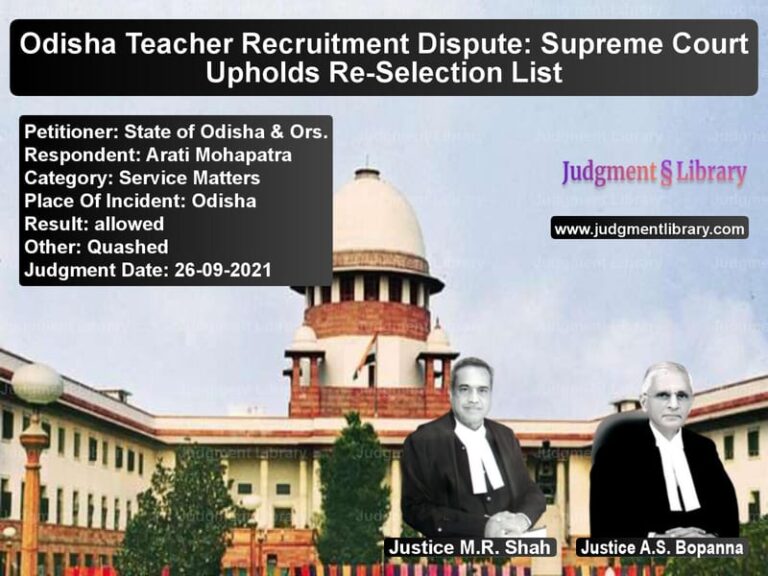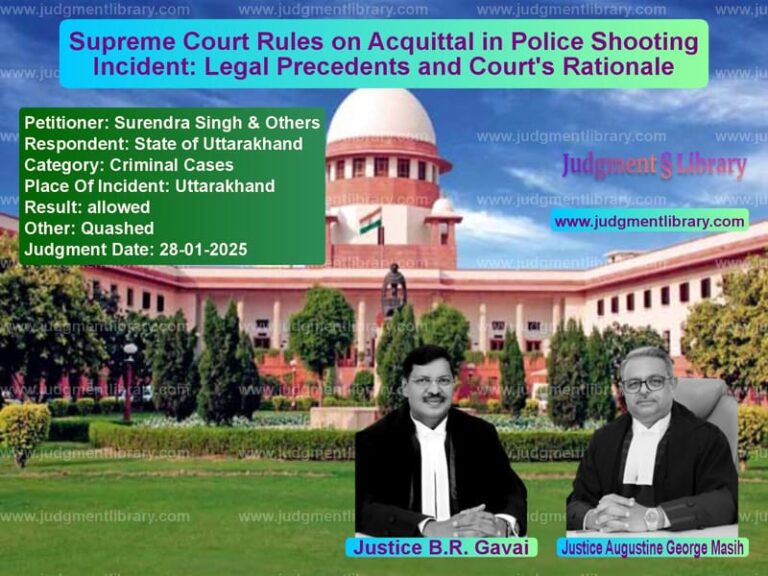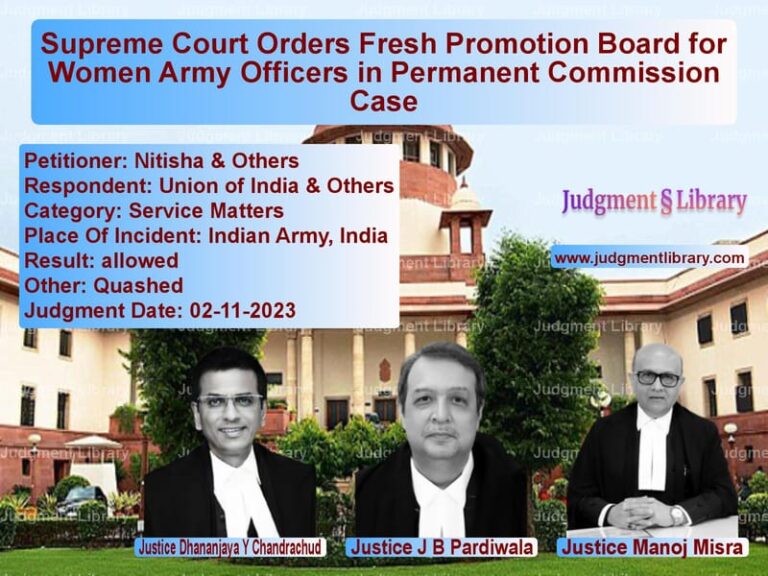Employment Claim Rejected: Supreme Court Rules on Land Acquisition Compensation in Eastern Coalfields Case
The Supreme Court’s decision in Eastern Coalfields Ltd. vs. Anadinath Banerjee & Others has provided a significant ruling on employment claims arising out of land acquisition compensation schemes. The case revolved around whether the respondent, who claimed to have lost land due to the expansion of a coal mining project, was entitled to employment under the rehabilitation policy of Eastern Coalfields Ltd. (ECL).
The Court ruled against the respondent, holding that employment benefits could not be granted based on land ownership claims backed only by affidavits from relatives. The decision reaffirms that compensation and rehabilitation packages must adhere to clear documentary evidence and not self-serving claims.
Background of the Case
Eastern Coalfields Ltd. (ECL), a subsidiary of Coal India Ltd., acquired land for the expansion of the Sonepur Bazari Open Cast Project in Raniganj, West Bengal. Under a tripartite agreement between ECL, landowners, and the state government, those who lost at least 2 acres of land were eligible for employment in ECL.
In 1991, a list of 37 eligible candidates was prepared, but the name of the respondent, Anadinath Banerjee, was not included. The respondent later claimed employment based on a 1993 certificate from the Land Acquisition Collector, which stated that his landholding, along with affidavits from relatives, amounted to 2.01 acres. ECL rejected his claim, arguing that he personally owned only 0.300 acres, far below the 2-acre requirement.
Petitioner’s Arguments (Eastern Coalfields Ltd.)
ECL contended:
- The respondent personally owned only 0.300 acres of land, as per official records.
- Affidavits from relatives did not confer legal ownership of land.
- The 2-acre eligibility condition was firm, and the respondent did not meet it.
- The claim was filed after more than 15 years, making it legally untenable.
Respondent’s Arguments
The respondent argued:
- That his relatives had transferred their land to him through affidavits.
- That the tripartite agreement should be interpreted liberally.
- That ECL had previously considered other candidates with similar landholding patterns.
- That denying him employment was arbitrary and discriminatory.
Supreme Court’s Observations and Judgment
Ownership Must Be Based on Documentary Evidence
The Supreme Court emphasized that self-serving affidavits from relatives do not constitute valid proof of ownership. It observed:
“There was no documentary evidence to indicate that the respondent had title to land in excess of two acres. The holding of relatives and others cannot be included in the holding of the respondent merely on the basis of self-serving affidavits.”
Family Unit Principle in Compensation Schemes
The Court noted that under land acquisition laws and social welfare schemes, compensation is provided to family units. It clarified:
“The principle that the ‘family’ is considered as a unit in rehabilitation schemes does not mean that relatives can transfer eligibility through affidavits.”
Tripartite Agreement Must Be Followed Strictly
The Court held that the employment scheme was contractually bound to the tripartite agreement and could not be diluted:
“The agreement’s eligibility criteria must be followed strictly. The High Court erred in granting employment contrary to the terms of the tripartite agreement.”
High Court’s Errors
The Supreme Court found that both the Single Judge and Division Bench of the Calcutta High Court had wrongly assumed that the respondent’s total landholding exceeded 2 acres. It ruled:
“The High Court erred in directing employment based on an incorrect interpretation of the agreement. An affidavit in favor of the respondent does not transfer rights in the property.”
Final Ruling
The Supreme Court allowed ECL’s appeal and set aside the High Court’s order, ruling:
- The respondent was not entitled to employment as he did not meet the 2-acre requirement.
- Land ownership must be proven through official records, not affidavits.
- The High Court’s ruling was contrary to the tripartite agreement.
Key Takeaways from the Judgment
- Employment claims must be backed by valid documents – Affidavits from family members do not transfer legal rights.
- Rehabilitation agreements must be strictly followed – Courts cannot modify eligibility criteria.
- High Courts must ensure correct factual interpretation – Erroneous assumptions can lead to legally unsustainable orders.
- Delayed claims may be rejected – Filing petitions years after land acquisition weakens legal standing.
Conclusion
The Supreme Court’s ruling in Eastern Coalfields Ltd. vs. Anadinath Banerjee clarifies that employment benefits under land acquisition schemes must adhere to strict eligibility criteria. It prevents misuse of compensation policies and ensures that claims are based on valid legal evidence.
Read also: https://judgmentlibrary.com/study-leave-for-government-doctors-supreme-court-ensures-fair-treatment/
By overturning the High Court’s decision, the judgment reinforces the need for fair and transparent land acquisition compensation mechanisms, protecting both government entities and claimants.
Petitioner Name: Eastern Coalfields Ltd..Respondent Name: Anadinath Banerjee & Others.Judgment By: Justice D.Y. Chandrachud, Justice M.R. Shah.Place Of Incident: Raniganj, West Bengal.Judgment Date: 23-07-2021.
Don’t miss out on the full details! Download the complete judgment in PDF format below and gain valuable insights instantly!
Download Judgment: eastern-coalfields-l-vs-anadinath-banerjee-&-supreme-court-of-india-judgment-dated-23-07-2021.pdf
Directly Download Judgment: Directly download this Judgment
See all petitions in Employment Disputes
See all petitions in Public Sector Employees
See all petitions in Recruitment Policies
See all petitions in Disciplinary Proceedings
See all petitions in Contractual Employment
See all petitions in Judgment by Dhananjaya Y Chandrachud
See all petitions in Judgment by Mukeshkumar Rasikbhai Shah
See all petitions in allowed
See all petitions in Quashed
See all petitions in supreme court of India judgments July 2021
See all petitions in 2021 judgments
See all posts in Service Matters Category
See all allowed petitions in Service Matters Category
See all Dismissed petitions in Service Matters Category
See all partially allowed petitions in Service Matters Category







